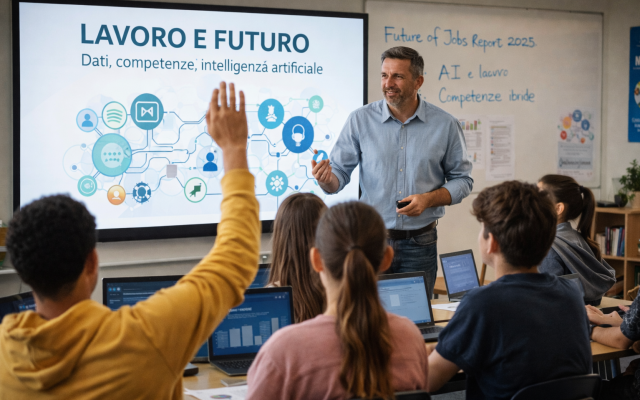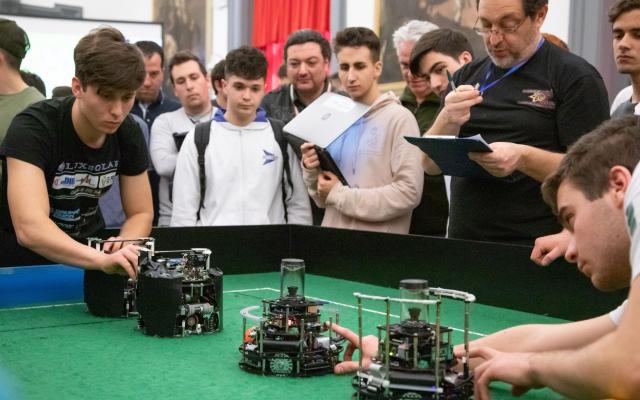Seydina Moussa Ndiaye at RomeCup 2025: ‘AI must serve all of humanity, leaving no one behind’
International guest at RomeCup 2025, Seydina Moussa Ndiaye, African representative on the UN Advisory Group on AI, shared the findings of the report ‘Governing AI for Humanity’. A strong call to build global, equitable and inclusive governance that combines human rights, cooperation and pragmatism. ‘Today we need a new social contract,’ he said, ‘so that artificial intelligence is a tool for collective well-being and not a source of new inequalities.’
We are making this content available to schools so that we can continue to reflect together on the evolution of the relationship between human beings and intelligent technologies.
Watch the video of the speech
Thanks to the Fondazione Mondo Digitale for the invitation and to the University for its hospitality. It is a great honour to be here in Rome, a city whose cultural and intellectual heritage continues to inspire all of humanity.
We are gathered for the 18th edition of the RomeCup, at a crucial moment in our technological history, to ask ourselves a fundamental question: what is the next step?
Artificial intelligence and emerging technologies are redefining our societies. Faced with this change, we have a collective responsibility to ensure that progress is guided by ethical, inclusive and sustainable principles. The RomeCup is more than just an event: it is a call to action for young people, researchers, educators and decision-makers to build together a digital future that leaves no one behind.
In this spirit of collaboration, I would like to share with you the work of the United Nations High-Level Advisory Board on AI, of which I am honoured to be a member. The group was established to reflect on global governance of AI based on human rights, inclusion and international cooperation.
Our recommendations, published in September 2024 in the report ‘Governing AI for Humanity’, aim to fill current gaps and propose concrete solutions to make AI a lever for shared progress. The group, composed of 39 experts from 33 countries and with gender parity (20 women and 19 men), was selected from over 1,800 applications. Its multi-stakeholder, interdisciplinary and diverse nature ensured unique perspectives.
Between 2023 and 2024, we consulted over 350 experts, received more than 250 written contributions from 150 organisations and over 100 individuals, and conducted 18 in-depth sectoral analyses. Despite limited resources, we have sought to include African, Asian, Latin American and Caribbean countries, which have traditionally been excluded from major decision-making processes, as much as possible.
Existing international initiatives involve only seven countries on a continuous basis, while 118 remain excluded. We have therefore adopted a truly global approach, seeking to create a model of fair, effective and efficient governance.
Inclusive governance implies a new social contract that ensures a fair distribution of benefits and responsibilities, respecting human rights, valuing community autonomy and promoting access to the opportunities offered by AI.
A holistic and cross-border approach is needed: AI is a general-purpose, dual-use (civil and military), rapidly evolving and often unpredictable technology. Responding to these challenges requires coordination between UN agencies and public and private stakeholders, as well as interoperability between regulatory frameworks.
Among the seven key recommendations, we propose:
- the creation of an international multidisciplinary scientific group, with annual reports and quarterly summaries on the impact of AI on the Sustainable Development Goals;
- a global policy platform to promote transparency, dialogue between the global North and South, and the sharing of good practices;
- the creation of a global fund for AI to support the ethical and inclusive adoption of artificial intelligence in less advanced countries.
Today, faced with the ethical challenges of our ‘techno-human’ condition, it is clear that good governance is not enough: the active participation of the younger generations is also needed. Let us move forward together with a common commitment to dignity, inclusion and innovation, so that artificial intelligence strengthens collective well-being and leaves no one behind.



